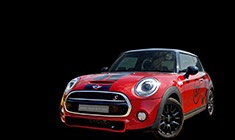News
BMW unveils production version of the i3 electric car
Late yesterday, the BMW i3 electric car was simultaneously showcased across three continents: Europe, Asia and North America. The first mass production electric vehicle from the world's largest luxury car maker, BMW, will go on sale in Europe by the end of this year. Sales in the United States and Asia will commence next year. The i3 electric car, according to BMW, is aimed at "sustainable mobility" across the spectrum of production, usage and after sales service.
The car has been developed entirely by BMW and is priced at 34,950 Euros in Europe and 41,350 USD in the United States. Adding the petrol engined range extender will make the BMW i3's price shoot up by 4,500 Euros. BMW has invested 2 Billion Euros towards the design and development of the i3 electric car. Armed with unconventional looks, the BMW i3 electric car does retain the traditional BMW kidney grille up front.
From this point on, the electric car's design seems to embrace function over form, practicality over striking looks. A crossover-like stance in a sub-4 meter compact car footprint are distinguishing characteristics of the i3, and so are the suicide style doors and the interior room for four adults. The BMW i3 employs a unique construction, necessitated largely by the requirements of light weight, high strength and safety.
The car's passenger compartment features a carbon fiber reinforced polymer (CFRP) body shell mounted on an aluminium chassis, making the i3's construction the 21st century equivalent of the body-on-ladder chassis. While the passengers sit in the CFRP compartment, the aluminium chassis that sits underneath the passenger compartment hosts the electric motor, lithium ion battery stack, single speed gearbox, range extender and the electronics of the electric car.
The extensive use of carbon fiber in the BMW i3 is to negate the additional weight that the lithium ion battery stack brings aboard the electric car. Effectively, by using carbon fiber, BMW has managed to partly get over one of the biggest limitations of electric cars, of that of weight and the accompanying loss in range. The BMW i3, which weighs a light-for-an-electric-car 1,195 kilograms, is powered by a 170 Bhp-250 Nm electric motor that derives its power from a lithium ion battery stack positioned in the floor pan of the car.
The positioning of the lithium ion battery stack is to give BMW i3 a low center of gravity, a factor that could deliver sharp handling. The electric motor is placed at the car's rear and drives the rear wheels of the car. The motor and the battery pack deliver a range of 130-160 kilometers/charge, which according to BMW is more than ample for city car buyers, who are said to seldom travel more than 64 kilometers a day.
The car also has two more range extending modes in the form of Eco Pro and Eco Pro+ modes. Turning on the Eco Pro mode will deliver an extended range of 20 Kms while the Eco Pro+ modes liberates another 20 Kms of range. Adding the optional range extender, which is a 650cc petrol engine that pumps of 34 Bhp, boosts range to 300 Kms on a single charge. The range extender extends range by acting as a generator to juice up the lithium ion battery stack of the i3. Brake energy regeneration is a standard feature on this car.
The range extender sits alongside the electric motor, at the rear of the BMW i3. The car gets a single speed transmission that drives the rear wheels of the car. With peak torque available right at standstill, the BMW i3 accelerates to 60 Kph in 3.7 seconds while the 100 Kph mark is achieved in 7.2 seconds. In the interest of conserving charge, BMW has limited the top speed of the i3 to 150 Kph. On the inside, BMW has outfitted the i3 with the Connected Drive system, touted to be the most advanced version of the car maker's telemetric and infotainment system.
The possibility of the BMW i3 being launched in India cannot be ruled out as the Indian government has rolled out the National Electric Mobility Mission Plan 2020 (NEMMP 2020). The NEEMP offers subsidies to electric and hybrid car makers, and for research and development activities aimed at production of such vehicles. Speaking to the EconomicTimes, here's what Mr. Harald Krueger, a BMW Group Board Member, had to say about the i3's viability for India,
I was in New Delhi last week. We have discussed about this with the concerned minister. We will definitely come to India as we see there is a potential market. But we cannot say when (i3 will be launched in India).




















_0.jpg)


